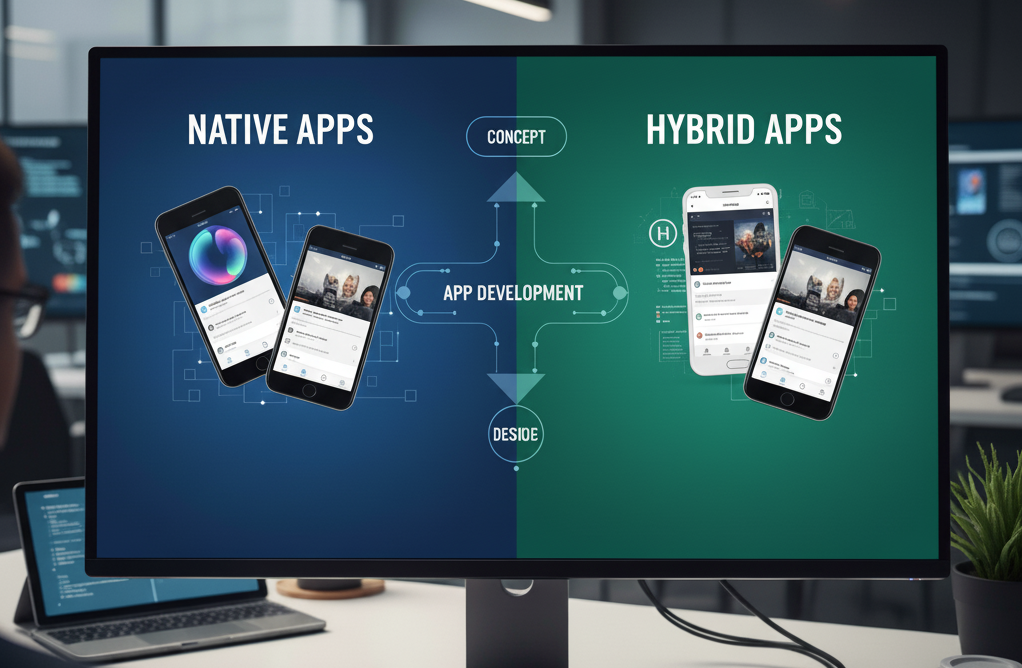Native vs. Hybrid Apps: Which is Right for Your Business?
In the ever-evolving landscape of mobile application development, it is a critical choice for businesses and developers to make between native and hybrid apps. Both approaches have their unique features, and understanding the differences can help in selecting the right strategy for a given project.
This blog explores the fundamental differences between native and hybrid apps, examining their development processes, performance, user experience, and use cases.
What are Native Apps?
Native apps are operating system specific (such as iOS or Android) applications. Native AppDevelopment Services built them using platform-specific programming languages such as iOS, Kotlin or Java, Swift or Objective-C for Android.
These apps are available for download from app stores like Apple’s App Store and Google Play Store.
Advantages of Native Apps:
- Performance: Native apps are developed for the specific OS, which results in a more responsive experience and faster performance. They can directly interact with the device’s hardware and system features, leading to smooth and efficient operation.
- User Experience: Since these apps are designed following the specific OS guidelines, native apps offer a consistent and intuitive user interface. This adherence to platform conventions ensures a seamless user experience.
- Access to Device Features: Native apps have full access to device features such as the camera, GPS, microphone, and more. This access allows for the implementation of advanced functionalities that rely on these features.
- Security: Native apps benefit from the robust security features of the OS, as well as the stringent review processes of the app stores. This results in higher security standards and better protection of user data.
What are Hybrid Apps?
App Development Company built Hybrid Apps using web technologies such as HTML, CSS, and JavaScript. These apps are essentially web applications wrapped in a native container, which allows them to be installed on a device like a native app. Frameworks like Apache Cordova, Ionic, and React Native are commonly used for developing hybrid apps.
Advantages of Hybrid Apps:
- Cross-Platform Development: Hybrid apps allow developers to write a single codebase that can run on multiple platforms. This significantly reduces development time and costs, as there is no need to create separate versions for each OS.
- Ease of Development: Web technologies are widely known and used, making it easier to find developers skilled in HTML, CSS, and JavaScript. This familiarity can speed up the development process.
- Maintenance: Maintaining a single codebase is simpler and more efficient than managing multiple codebases for different platforms. Bug fixing and updates are readily available to rollout easily across all platforms.
Choosing Between Native and Hybrid Apps
The decision between native and hybrid apps depends on various factors, including the specific requirements of the project, budget constraints, and the target audience. Here are some factors to assist in making the choice:
- Performance Requirements: If the app requires high performance, complex animations, or intensive graphics, a native app is likely the better choice.
- Budget and Time Constraints: For projects with limited budgets or tight deadlines, hybrid apps can offer a faster and more cost-effective solution.
- Target Audience: Consider the preferences and behaviors of the target audience. If users are likely to be on a single platform (e.g., iOS), a native app might provide a better experience.
- Future Maintenance: Think about the long-term maintenance of the app. Hybrid apps can simplify updates and maintenance across multiple platforms.
Conclusion
Both native and hybrid apps have their place in the mobile development ecosystem. Native apps offer superior performance and user experience but come with higher development costs and complexity. Hybrid apps provide a cost-effective, cross-platform solution but may compromise on performance and access to device features. By carefully evaluating the project requirements and constraints, businesses and developers can choose the approach that best aligns with their goals and delivers the desired user experience.


